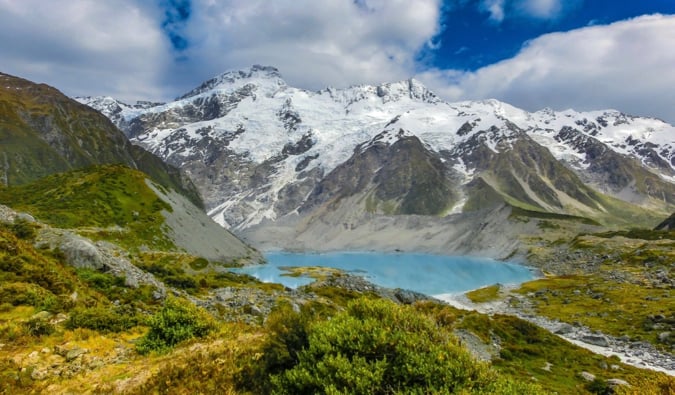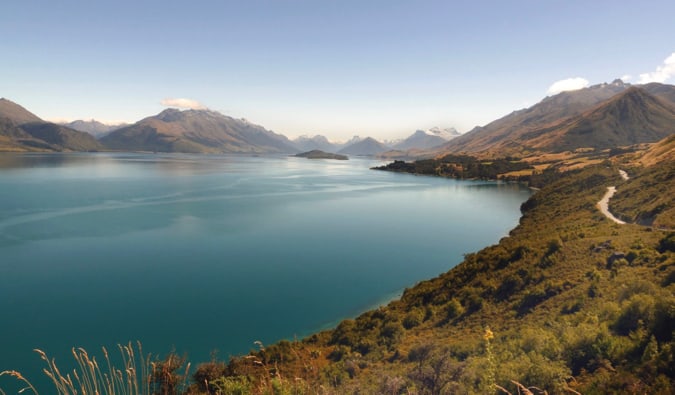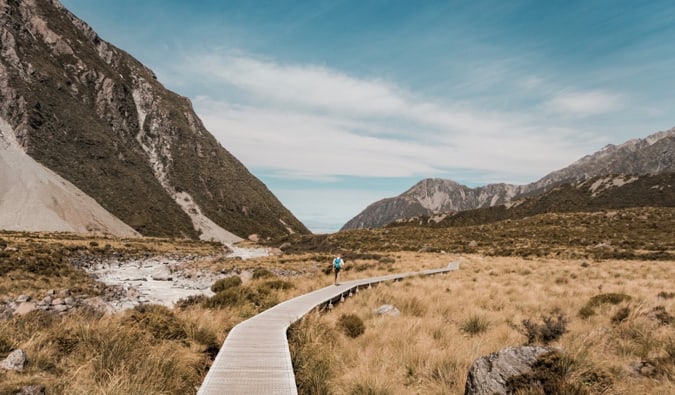
New Zealand. The land of Middle Earth, Great Walks, kiwis, backpackers, adventure sports, delicious wine and pristine wine regions.
And a land that sucks all your money from your wallet like a giant vacuum.
I first visited New Zealand eight years ago. The country was so much more expensive than I thought it would be. Back then, I was a cheap(er) backpacker and focused on saving as much money as I could. I cooked most of my meals, hitchhiked, skipped all the costly adventure sports, and drank a diet of cheap boxed wine and happy hour beer.
But, when I visited earlier this year, I changed my MO this trip. I was going to say yes to everything, regardless of cost.
I wanted to really know how much money you need in New Zealand for a variety of budgets. What’s it cost to be a broke backpacker? A mid-range traveler? Or a mix of the two? What if you want to eat out a lot but also hike or sleep in a van? What if you want to do all the adventure activities in the world? What if you just let the tab pile up?
So I became the Nomadic Matt of many budgeting hats. And, in the process I learned a lot about, the true cost of traveling New Zealand.
Let’s break it down.
How much did I spend in New Zealand?

Over the course of my 25-day visit, I spent $4,550.90 NZD ($3,292.74 USD), averaging $182 NZD ($131.68 USD) per day.
That’s a lot of money. Like holy hell a lot of money! Way more than my $50 USD a day guideline.
Here’s how my spending broke down:
- Accommodations: $913.64 NZD ($661.05 USD)
- Spark phone service: $164.68 (119.15)
- Pharmacy: $39.98 (28.93)
- Internet: $15.29 (11.06)
- Groceries: $235.52 (170.41)
- Transportation: $1,014.32 (733.90)
- Activities: $823.65 (595.94)
- Restaurants: 1343.82 (972.30)
Total: $4550.90 NZD ($3,292.74 USD)
I spent a lot of money, but, again, I said yes to everything. I knew taking scenic planes, trains, and helicopter rides; staying in private rooms, and meals out was going to cost a lot of money.
But even I was surprised how much I spent when I wasn’t tracking my spending.
Looking back, there were things I could have done to lower my costs.
I could have saved money by eating out less or by booking less expensive Airbnbs instead of hostel private rooms (which are always a terrible deal but I wanted to be around other travelers).
With a lot of ground to cover, I couldn’t always spend a day on a bus so flying really increased my costs. Additionally, the scenic rail I took (while awesome) was also $159 NZD! And transportation to Stewart Island is $160 NZD! Instead of doing them all, I could have picked one or the other.
And I definitely blew through way too much phone data. As a person not used to data limits, being data limited at hostels (around 1 GB per day) was new territory for me as I tried to stream Netflix. I picked up the slack on my phone by just ordering more data and not really thinking about it.
If I was slightly more conscious about my dining, accommodation, and spending habits, I easily could have cut $20 USD or more per day from my budget.
How much does New Zealand really cost?

So how much do you need to budget in New Zealand then? If you’re going to travel like I did, budget $110-130 USD a day. This will let you travel carefree and basically do anything you want (within reason). Fly, take scenic trains, expensive ferries, scenic flights, drink expensive wines, have expensive dinner – New Zealand is your oyster!
A more “I want to do a lot but still want to be budget”, a budget of around $142 NZD ($100 USD) a day will get you private rooms in Airnbs, a large number of activities (I let no winery go unvisited!), the occasional flights, and restaurant meals about 70% of the time.
If you’re going on a backpacker’s budget, I’d say you need around $71-85 NZD ($50-60 USD a day). That will get you a hostel dorm room, bus transportation, happy hour drinks, one or two expensive activities (bungy, scenic flights, skydive, etc), and mostly self-cooked meals (around 70-80% of your meals).
If you are going to rent a campervan or self-drive, you could knock $15 NZD ($11 USD) daily off your budget since your van will act as accommodation too. On an even tighter budget, with Couchsurfing, hitchhiking, few if any activities, and cooking 90% or more of your meals, you could get by on $40 NZD ($28 USD) per day. It’s not easy to do but I met travelers who did it. It requires a lot of discipline though.
Here are some sample costs:
- Spark Phone plan (with 4.5 GB of data) – $40 NZD ($20 with 1.5 GB of data)
- Buses booked far in advance – $1 NZD per ride
- Buses booked last minute – $20-60 NZD
- Airfare – Varied wildly but you’re looking at least $50 NZD each way.
- Scenic trains – $159 NZD each way
- Full-day Bay of Islands cruise – $259 NZD
- Hobbiton tour – $84 NZD
- Nevis Bungy – $275 NZD
- Franz Josef Glacier Guides Heli Hike – $459 NZD
- Waitomo glow worm caves – $51-246 NZD depending on if you walk, raft, or abseil
- Hostel dorms – $20-30 NZD
- Hostel private rooms – $55-$100 NZD
- Airbnb – $50+ NZD for a shared location, $80+ NZD for a whole unit
- Wine tours – $150+ NZD
- Drinks – $8 NZD for a beer, $10-15 NZD for wine or cocktails, and $5 NZD for a happy hour drink
- Bar crawls – $20-30 NZD
- Casual restaurant meal – $15-25 NZD
- Fast food meal – $11-20 NZD
How to SAVE money in New Zealand

Spending so much money taught me a lot of about how to save money in New Zealand. Where your budget will go to die in this country is with activities and meals. Adventures activities are crazy expensive, most of them costing $200 NZD or more! I mean a heli-hike in Franz Josef was $450 NZD! That’s CRAZY! Moreover, with most meals costing $20-30 NZD ($15-22 USD), your budget is going to be gone quickly if you eat out a lot (food represented 34.7% of my total spending).
New Zealand’s groceries weren’t that expensive (it’s an agricultural country after all), and there are a lot of free hikes to replace those expensive activities. Taking advantage of these should help lower your costs substantially. When I was in Wanaka, I only spent around $50 NZD ($36 USD) each day ($30 for my dorm, $20 for food and drink, and $0 for activities since nature was free!). It can be done.
Simply put, New Zealand doesn’t have to be expensive if you don’t want it to be. After all, if it was, so many backpackers wouldn’t come here in droves. I mean how many hordes of backpackers go to Norway? Not a lot! Why? It’s f*ing expensive unless the only thing you do is camp! New Zealand has a middle ground. It’s whatever it is you want it to be.
Here is how to save money while there:
Cook (a lot) – I know this is going to sound crazy but, and I can already hear the comments coming, the food scene in New Zealand isn’t that mind-blowing. Yes, there are nice cafés, some hip gastronomy, and really delicious meals, but nothing that’s so mouth watering delicious you have to blow your budget on it. I never walked away going “That was a meal I couldn’t get at home! I’m glad I just spent $60 bucks!”
No. In fact, my biggest regret is that I spent so much on food. I should have cooked a lot more. I feel like I wasted a lot of money not doing so. I probably could have saved about $800 NZD by cooking more and, honestly, I don’t feel like I would have missed anything too great.
So cook as much as possible. You’re going to save a ton of money. Heck, even a burger and fries is $20 NZD! I’m not saying you shouldn’t ever eat out, just do so sparingly.
A week’s worth of groceries will set you back between $80-100 NZD. The cheaper supermarkets are Pak’nSave and Countdown.
Choose your tours wisely – Tours cost a lot of money in New Zealand. Going on just a few is enough to bust any budget and send you home before you had planned. Pick the ones you really want to do and save the rest for another trip.
Hit happy hour – The backpacker bars have cheap happy hours offering $5 NZD drinks — take advantage of them.
WWOOF it – WWOOFing is a way to get free accommodation and food in return for working on a farm or in a B&B. You can do it for a few days or a few months. It’s a popular activity with travelers because it lets you travel cheaper and longer. Keep in mind, though, most farms will require you to have some experience, as too many inexperienced workers have caused them trouble in the past.
Work at a hostel – Many hostels let you trade a few hours of cleaning and making beds for free accommodation. Ask when you check in if this is possible — it might just save you some money!
Car share – Car shares are a popular transportation option for travelers looking to lower costs — all you need to do is chip in for gas. You can find rides on websites like Gumtree and Craigslist. Additionally, you’ll see people asking for rides on hostel bulletin boards. As for ridesharing apps, check out Thumbs Up NZ or Carpool New Zealand. (I never found a New Zealand version of BlaBlaCar but if anyone knows of one, let me know!)
Couchsurf – While there are not a ton of Couchsurfing options in the country, there are hosts in all of the major cities. If you don’t mind sleeping on a couch or floor, this is not only a way save money on accommodation but also a way to meet some amazing locals too. (Don’t just use this as a free hotel. If you don’t want to interact with your hosts, don’t use this site.)
Hitchhike – Hitchhiking is easy in New Zealand. Besides Iceland, it’s probably the easiest country in the world to hitchhike in. There are plenty of people who will pick you up. Additionally, you can just ask around any hostel and find a ride — everyone is doing the same circuit. I got from Wanaka to Queenstown to Fiordland that way. Between message boards, Couchsurfing forums, the people you meet in hostels, and just thumbing it on the side of the road, you can always find a ride.
Take a free walking tour – There are a few free walking tours in New Zealand, like the Auckland Free Walking Tour or WellyWalks Limited in Wellington, that offer visitors (and locals) insight into each city.
Remember that nature is free – New Zealand, home to the Great Walks of the World, has tons of free outdoor activities. While the adventure sports, wine tours, glacier treks, and boat cruises can eat into your budget, all the trails and walks are free. You can easily fill your day with free hikes, excursions to the lakes, or days on the beach!
And keep in mind the majority of museums in the country are also free!
Get a bus pass – I tend to buy transportation last-minute so I never scored super discount fares, which is where bus passes come in. I bought the $135 InterCity FlexiPass for 15 hours of travel. I’d suggest this since it is hours based and lasts forever. It will save you a lot of money versus booking last-minute tickets on the bus.
You can find out more on how to get around on a budget in my last post. I list a lot of resources there.
Skip the backpacker buses – While they’re fun, backpacker bus tours like the Kiwi Experience, Stray, or Haka are expensive! Best to avoid them if you are on a tight budget. If your budget isn’t so tight and you do want to check them out, be sure to sign up for their mailing lists first — there is always a sale on.
Use Book.me.nz – This website provides last-minute discounts on activities (and pub crawls) throughout the country. If you’re flexible about when you want to do things, you can save up to 60% off attractions and activities! I can’t recommend it enough. It saved me a lot of money.
Saving money in New Zealand is about picking and choosing your battles. As you can see, when you just don’t care, costs can really go up. I made plenty of spending mistakes that upped my daily average a lot. But if you get a bus pass, cook a lot of your meals, find rideshares, stick to Airbnb rooms (or split rooms with friends), and campervan it, New Zealand won’t be that expensive.
Just be sure to watch your budget!
The post The Cost of Traveling New Zealand appeared first on Nomadic Matt's Travel Site.
No comments:
Post a Comment